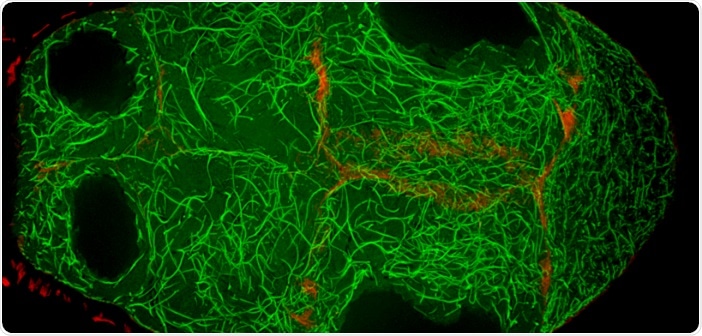According to a research work performed by Northwestern Medicine and published in the Current Biology journal, a protein helps guide the flow of materials in the ovary of Drosophila fruit flies during the formation of egg cells.

Microtubules (green) are bound with actin (red) through the shortstop protein, creating bridges on which motor proteins transport materials to the oocyte. Image Credit: Northwestern Medicine.
Short Stop is a protein that aids in the organization of microtubules, which transport RNA, proteins, and even whole organelles from nurse cells to the oocyte, which cannot produce its own.
This is part of the big question: What is the mechanism that moves things from the nurse cells to the oocyte?”
Vladimir Gelfand, PhD, Study Senior Author and Leslie B. Arey Professor, Cell, Molecular, and Anatomical Sciences
Egg cells, also called oocytes, emerge from stem cells quite early in the life of an organism. During the development of oocytes, specialized “nurse cells” pump messenger RNA (mRNA), proteins, and other materials into the oocyte, providing the oocyte with the ingredients it needs to construct structures required for the development of an organism.
“They share organelles, they share everything,” stated Gelfand, who is also a professor of Cell and Developmental Biology and a member of the Robert H. Lurie Comprehensive Cancer Center.
Transport from the nurse cells to the oocyte happens only in one direction, that is, via specialized ring canals. According to the researchers, the mechanisms behind this directionality were previously unknown.
In this analysis, Wen Lu, PhD, a research associate in the Gelfand laboratory and the study lead author, utilized RNA interference (RNAi) to preferentially knock down particular transport genes in Drosophila fruit flies, looking for one that, when deleted, would influence the size of the oocyte.
Lu observed that the Short Stop protein is required for unidirectional transport. The protein connects actin filaments on the side of the nurse cells with microtubules emerging from the side of the oocytes, thus supporting the organization of microtubules that serve as tracks for motor proteins to transport organelles and proteins across.
Most significantly, these microtubules are polarized and are assembled with the plus ends facing the nurse cells and the minus ends facing toward the oocyte. Cytoplasmic dynein, the motor protein that transports materials to the oocyte, is programmed to run toward the minus ends, guaranteeing transport in the right direction.
But when the Short Stop protein is removed, microtubule polarity is disrupted, resulting in bi-directional transport and restricting oocyte development.
It’s like building a highway that only goes one way, but if we delete Short Stop it becomes a two-way street. The oocyte is receiving some materials, but it’s also giving some up — so its net growth is zero.”
Wen Lu, PhD, Study Lead Author and Research Associate, Gelfand laboratory
According to Gelfand, this mechanism also exists in mammals, and hence exploring these processes in flies will allow the scientific community to better understand the intricate mechanisms that regulate the development of oocytes in humans.
Gelfand also stated that the laboratory intends to investigate the motor proteins that carry materials from the nurse cells to the oocyte.
Source:
Journal reference:
Lu, W., et al. (2021) Gatekeeper function for Short stop at the ring canals of the Drosophila ovary. Current Biology. doi.org/10.1016/j.cub.2021.05.010.